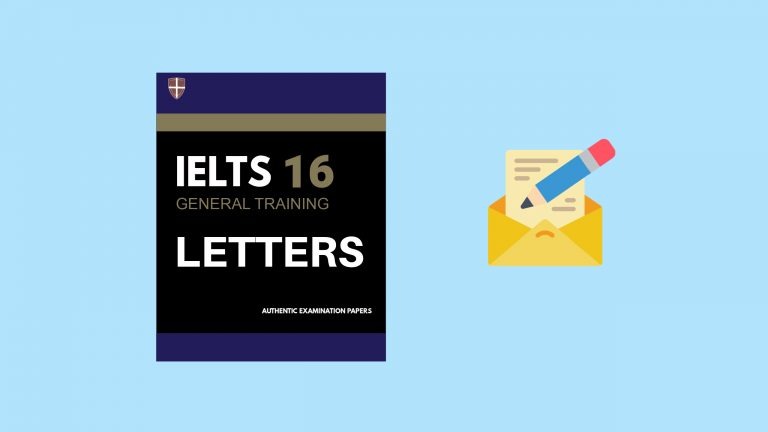
What do we think of the Cambridge IELTS 16 Letters?
Hey everyone! I don’t know if I have been under a rock for the last month, but a student brought it to my attention this week that he new IELTS Cambridge 16 General Training book has been published. That means we have four new full tests to use to hone our IELTS skills. Honestly, though, the first section that I always turn to is the writing exam. I mean, nothing is more exciting than having 4 brand new essay questions to analyse, right? Well, almost nothing! This time I found it was the letters that caught my attention more! So, in today’s episode, join Nick and I as we look at the Cambridge IELTS 16 letters!
We will rank the four prompts in order of difficulty from easiest to most challenging. Then we will analyse each bullet in the prompts to make sure that you have the lexis and grammar structures that you will need to complete the letters well. Trust me, the Cambridge IELTS 16 letters are NOT the same as other books! The letter to Mrs Barrett is worth the price of the book on its own!
Please remember that good students do not do test after test. If you are new to IELTS and Cambridge 16 is your first book, please read this blog post to see how you should (and should not) use this valuable resource.
Below, you can find a summary of the episode, which includes all of the links to useful materials and the times of each part of the discussion (so you can go directly to the part you want to listen to) 🚀
- Subscribe to My IELTS Classroom podcast on Apple podcasts here
- Subscribe to My IELTS Classroom on Google podcasts here
- Become a Patreon to gain access to extra BONUS episodes here

Cambridge IELTS 16 Letters
In today’s episode, Nick and I discuss all of the Cambridge IELTS 16 letters. We strongly recommend that you purchase the Cambridge 16 book if you are preparing for the exam as it is the latest edition of the book and contains the most recent tests. For copyright reasons, we will not post the 4 letter prompts here, but we will read them in the episode for any student who does not yet have a copy of the book.
The 4th most difficult Cambridge IELTS 16 Letter – Letter to a friend about accommodation
If you have been preparing for IELTS for any length of time, you will know that university accommodation is a common letter prompt. We have seen many forms of this letter in the past, from writing to a university accommodation officer to request a place to live (formal) to writing to a friend to ask for help finding accommodation (informal). This letter is similar, but this time it is you offering advice about where to live rather than asking for it.
As the topic is familiar, this is the easiest of the four prompts in the books (in my opinion). All IELTS students should have some lexis prepared to talk about accommodation, including different types of university accommodation (a share house / halls of residence / a one-bedroom apartment) and how you can find a place to stay (contact the accommodation officer / look in the local newspaper / join a Facebook group / look at a local estate agent’s website).
However, there is one bullet in this letter that is unique and may cause problems for some students. That is the bullet that asks you to warn your friend about common problems when looking for accommodation. I have not seen the function “warn” in any previous letters and some test-takers may struggle to do this well.
In terms of grammar, we usually use an imperative when we are warning. This just means we start a sentence with a verb and no subject. For example, here are some nice imperatives that could be useful for the third bullet:
- Make sure you check for damp / get a receipt when you pay a deposit
- Make sure you don’t find a house next to the main road / don’t pay before you have looked at the house.
- Be careful of private landlords.
- Try to sign a contract for 9 months not 12.
- Try not to live in a house with too many people
Do you know how to make sure you letters have the right tone? If you are unsure what the difference is, in terms of language, between a formal, semi-formal, and informal letters, then I strongly recommend that you watch our free video lesson, which explain it clearly here.
The 3rd most difficult Cambridge IELTS 16 Letter – Letter to a newspaper about your town
Letters to a newspaper about incorrect information are becoming increasingly common in the IELTS exam. This time, though, we are asked to complain about a specific mistake – the false accusation that all towns in your country look the same.
My immediate thought when I read this question was that it is very culturally specific. In the UK, this a common complaint – all our town centres have the same three types of shop – cafes, betting offices, and charity shops. However, I am sure that many of you reading this live in countries whose towns do not look the same.
Therefore, some students could struggle with ideas for this topic. As the prompt says that “towns look the same”, I would focus on the shops and architecture here (and this would be a great time to use some of the building lexis that we studied a few weeks ago in this lesson!)

Aside from ideas, this prompt also has one bullet that may challenge students in terms of language. That is the first one that asks you to say which points of the article you agree with. I would recommend that you start your paragraph with one of the following sentence stems:
- Actually, I concede that…..
- Actually, I do admit that ……….
- Actually, there are some parts of the article that I do agree with.
The 2nd most difficult Cambridge IELTS 16 Letter – Letter to a newspaper about a book that influenced you most
At first glance, this prompt may seem easier than the previous one as we have all read books that made an impact on our life. However, I think that many students will come unstuck here by choosing a book that has a philosophical theme. Sure, we all have books that we read that inspired us in some way or made us look at our lives differently, but I think any type of novel would be a bad choice here.
Why? Well, because it can be very difficult to summarise the plot of a 500 page book in 50 words. Worse, describing the feelings or emotions that a book inspired in you is even more difficult – I find doing that hard and I am a native speaker.
So, what is the solution to this problem? If a novel is a bad idea, what is a good one? Well, I would recommend that you choose a self-help book i.e. one that taught you about diet or giving up smoking or management techniques. I think it would be much easier to summarise how a book on time-management influenced you than a novel.

Another good choice would be an autobiography. 99% of the time, the reason that a person has written an autobiography is because they are inspirational in some way, so this would be a great choice. Even better, choose the autobiography of a famous person in your country who the examiner won’t have heard of – that way you can write anything you like about the person without worrying that it is not true!
We are the CLB9 and 10 experts. Find out how we can help you shorten your path to Canada here
The MOST difficult Cambridge IELTS 16 Letter – Letter to Mrs Barrett
I have almost no words to say about this letter as it is so strange. Who is Mrs Barrett? Why does she need help in her home? Why is she living in a foreign country? I have so many questions about Mrs Barrett and I am sure test-takers in the exam would too. Having such a strange topic already makes this letter difficult and we haven’t even looked at the bullets yet.
But it is here that things get really difficult. The 1st and 2nd bullets are strongly linked and if you don’t plan your letter carefully, you can get into trouble quite quickly. Why? Well, the first bullet asks you to suggest ways that you can help Mrs Barrett in her home. The obvious response to this would be to offer to clean. However, the second bullet asks you to give a reason why you would like the work. Can you think of a reason why you would like to clean a person’s home? The only possible answer here is “I need the money” but that it is not a very persuasive reason why she should give you the job!
Therefore, you have to think carefully about how you approach the first bullet so that the second one makes sense. My ideas would be:
- Cooking – I really like to cook and am thinking of becoming a chef
- Odd jobs (change plugs / touch up any paint / put up some shelves / clean your gutters – I am good with my hands / I do all the odd jobs around my home and enjoy them
- Gardening – I like being outside / have green fingers
Obviously, your description of how you can help in the home is your opportunity to show the examiner topic specific lexis, so use it wisely!

